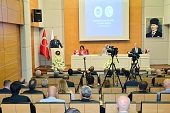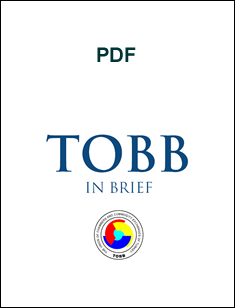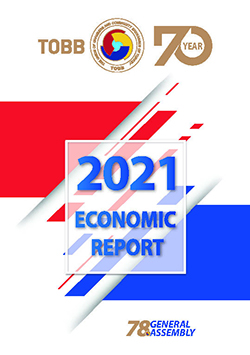IKV General Assembly Meeting

21.07.2025 / İstanbul
The 63rd Ordinary General Assembly Meeting of the Economic Development Foundation (IKV) was held at the Union of Chambers and Commodity Exchanges of Türkiye (TOBB) İstanbul Service Building.
In his speech at the opening of the event, Ali Kopuz, Deputy Chairman of the Board of Directors of TOBB, gave information about the activities carried out since the establishment of IKV.
Stating that we are living in a period of increasing protectionism, deepening climate crisis, accelerating digital transformation and changing geopolitical balances, Mr. Kopuz pointed out that we are going through an environment of uncertainty.
Pointing out that this environment of uncertainty poses serious threats to economies like Türkiye and the EU, which are open to foreign trade and articulated to global trade, Kopuz noted the following:
“Türkiye’s foreign trade to GDP ratio is 47 percent compared to 97 percent for the EU. These ratios clearly show the risks we face. Therefore, our long-term competitiveness can only be safeguarded through deeper and more durable partnerships. As a candidate country, Türkiye occupies a critical position in the EU value chain. Türkiye is an indispensable partner for the EU with its dynamic production infrastructure, young and qualified labor force, and strategic geography linking Europe to Asia, the Middle East and North Africa. The most important step to deepen cooperation is to update the Customs Union. The current framework is no longer responsive to today’s trade and investment relations. Modernizing the Customs Union is not just a trade issue. It is crucial for strategic alignment, competitiveness and common security. It would also be a powerful symbol of the restoration of trust between Türkiye and the EU.”
Pointing out that visa problems experienced by Turkish business people have become a serious obstacle to trade, Kopuz said that long waiting times for appointments and uncertainties about the process make it difficult for business people to participate in fairs and supply relations.
Stating that business people should not be seen as potential refugees, Kopuz said, “Solving this problem will increase our trade and reinforce mutual trust. Another important issue is road transportation quotas. Road transportation in Türkiye-EU trade provides a great advantage in terms of fast delivery and supply chain. However, current quota practices delay the delivery of goods and increase costs. We should make our trade more efficient by solving this problem.”
- “We have to design an architecture of cooperation”
ICI President Erdal Bahçıvan pointed out that IKV, one of the most respected specialized organizations in Türkiye, which has been working for the development of relations between Türkiye and the European Union since its establishment, has made significant efforts to promote Europe to Türkiye and Türkiye to Europe.
As of 2025, the uncertainties faced by the world economy, geopolitical vulnerabilities and the rising wave of protectionism make international cooperation more necessary than ever, Bahçıvan said, “While trade wars are escalating at the global level, countries are repositioning themselves on topics such as energy security, green transformation and digital competition.”
Bahçıvan mentioned that issues such as the Russia-Ukraine War, the humanitarian crisis in Gaza, Israel’s escalation of tensions with countries in the region such as Syria and Iran, trade security issues in the Red Sea, concerns over energy supply security, and new routes in global supply chains have once again demonstrated the importance of more stable partnerships and relations based on mutual trust.
Recalling that many prominent policymakers, including former European Central Bank President and Italian Prime Minister Mario Draghi, have issued serious warnings that the EU’s economic model and its lag in technological competition have reached an unsustainable point, Bahçıvan noted the following:
“In addition, the systemic blockage in the EU economy, rising income inequality and the serious problem of migration bring with them the rise of ultra-nationalist political movements in the region and the risks of political instability. On top of all this, a tariff move by the US could further complicate the situation within the EU, our most important foreign market. In the period ahead, we need to closely monitor developments in this critical trade partner on a country-by-country basis and take the necessary measures without delay. In this transformative environment, the economic and strategic partnership between Türkiye and the EU is no longer a choice, but a geo-economic necessity necessitated by interdependence. First of all, the trends of ‘close production’ and ‘procurement from friendly countries’, which have been seriously observed in recent years, will bring Türkiye’s position in terms of both logistics and production capacity to the forefront, and we will be able to integrate into global production chains permanently and effectively.”
Stating that Türkiye’s strong production infrastructure, strategic geographical location and human resources have created not only an economic but also a strategic partnership ground for the EU, Bahçıvan said that the foreign trade volume with the EU reached 221.6 billion dollars in 2024, with 42.5 percent of exports directed to EU countries.
However, Bahçıvan emphasized that despite this volume, the fact that trade still faces structural barriers in such an integrated economic relationship creates mutual loss of opportunity for the parties:
“At this point, we have to design a cooperation architecture that does not only focus on trade figures, but also on the climate crisis, defense industry, supply chains and regional security. While Türkiye’s economic integration with the European Union is at such an advanced level, visa applications for the Schengen area still hamper both individual mobility and economic cooperation. In 2009, Türkiye’s visa applications numbered around 550,000 and by 2024 it exceeded 1.1 million, while the number of visa refusals more than quadrupled from 41,000 to 171,000 in the same period. While Türkiye’s average Schengen visa refusal rate was 6 percent between 2009-2019, this rate increased to 15 percent in the 2020-2024 period. Visa processes create a serious burden not only with rejection rates, but also with the difficulty of finding appointments, long processing times and excessive bureaucratic demand for documents. Our business people postpone or cancel many commercial activities such as participation in fairs, investment negotiations and partnership initiatives due to these delays. These obstacles in visa processes harm the competitiveness of the Turkish business community integrated with Europe, as well as the EU’s commercial interests with Türkiye.”
Pointing out that Türkiye has a larger trade volume than almost all of the 61 countries that are granted visa-free travel, ISO President Bahçıvan said that for this reason, it is useful to address the visa issue not only as a mobility or free movement issue, but also as a structural obstacle to trade and production.
In this context, Bahçıvan said that they welcomed the European Commission’s decision dated July 15, 2025 to facilitate the issuance of multiple-entry visas for Schengen visa applications from Türkiye and that they considered this decision as a constructive step in the right direction, adding, “The need for a comprehensive and coordinated liberalization mechanism for groups that require intensive contact, especially the business world, is still ongoing. Any delays and refusals regarding visas directly affect the real sector and our economy. For this reason, we believe that the private sector should actively participate in visa negotiations for a more effective solution of concrete problems in visa applications.”
- “As Türkiye, we also need to accelerate reforms and continue the EU harmonization process”
IKV President Ayhan Zeytinoğlu pointed out that the EU should abandon the practice of tying relations with Türkiye to the Cyprus issue and mentioned that it is important to deepen defense cooperation with the EU by overcoming these obstacles and to increase the international cooperation and initiatives of the Turkish defense industry with European companies.
Zeytinoğlu informed the participants about the issues that IKV has primarily addressed in its research, publication and information activities in the last period and said, “As Türkiye, we need to accelerate reforms and continue the EU harmonization process. In addition, developing cooperation in areas such as energy, climate, transport, defense, foreign policy on the basis of common benefit will also benefit Türkiye’s interests.”
Zeytinoğlu reminded that the European Commission made some improvements in the visa process with the decision it took on July 15th and said: “I know that our Ministry of Foreign Affairs is also working hard to facilitate visas. I congratulate our Deputy Minister for these developments. 25 EU countries will grant multiple-entry visas to those who use their Schengen visas in accordance with the rules, which will gradually increase in duration. Although not enough, this is a positive development. This will not only reward those who comply with the rules, but will also reduce the number and frequency of applications, thus reducing congestion and waiting times at consulates. However, TIR drivers are excluded from this application on the grounds of special risk. This is an important deficiency.
This is because driver visas are a major obstacle for the free movement of goods. Drivers need to reapply frequently. In addition, the rule of staying in the Schengen area for 90 days in a 180-day period slows down the transportation process. Such improvements to Schengen visas should be followed by further simplifications. Measures should also be taken to make it easier to make appointments, control surcharges and reduce rejection rates. We are the only candidate country without visa-free access to the EU. While Georgian citizens working in Türkiye can enter the EU visa-free, Turkish citizens face visa barriers. Our goal continues to be full visa liberalization.”
Deputy Minister of Foreign Affairs Mehmet Kemal Bozay, who attended the meeting online, gave information about the work and processes carried out by the Ministry on relations with the EU and said that they care about the demands and opinions of business people and that they will continue to work together in this field.
Your message has been sent
Thank you |




